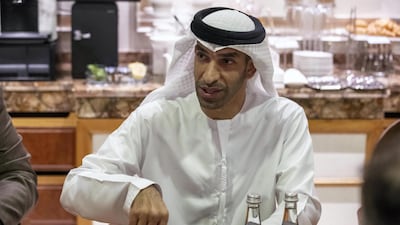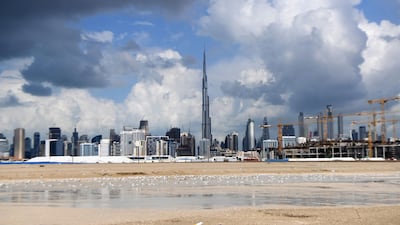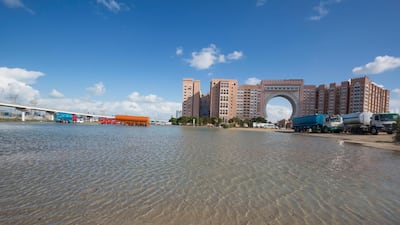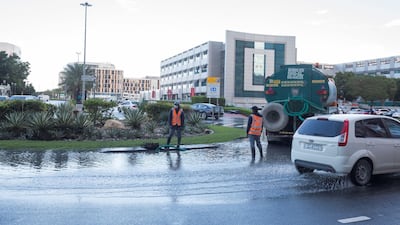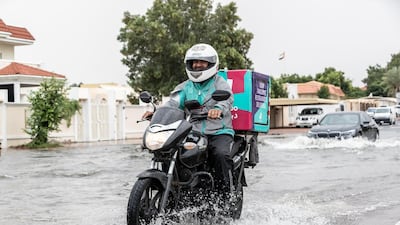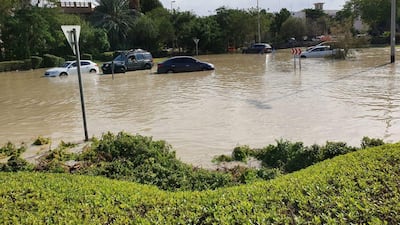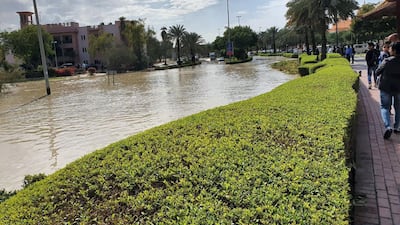Latest: Enough rumours, cloud seeding had nothing to do with UAE's three-day rain storm
Extreme rainfall that caused chaos across the UAE at the weekend was linked to climate change, the country’s Minister of Climate Change and Environment said.
Dr Thani Al Zeyoudi said extreme weather events had become increasingly common across the world because of global warming and that he believed the sustained storms that battered the Emirates may well be the latest example.
“The UAE has been affected badly by climate change, through various means,” he said at the International Renewable Energy Agency assembly in Abu Dhabi on Saturday.
Dr Al Zeyoudi cited recent bushfires in Australia and the increased frequency of cyclones as examples of extreme weather events attributed to climate change.
Asked whether he thought the recent UAE storms were another example, he replied: “Absolutely”.
“Yesterday, everyone was saying this was real climate change – we haven’t seen such high rain for a very long time. So we do see the weather is changing, the climate is changing.”
Preliminary figures suggest 150mm of rain fell each hour, for two-and-a-half hours, at the peak of the downpours, Dubai Media Office said.
During a typical January in the Emirates, about 10mm of rain falls on average, meaning more than 30 times as much rain fell within three hours than usually falls in a month.
The heavy rain caused widespread flooding, leading to chaos on roads, damaging homes and forcing schools to close.
Speaking to journalists, Mr Al Zeyoudi reaffirmed the UAE’s commitment in playing a major role in tackling the global climate emergency.
He said he was confident the country would hit an ambitious target to generate half of its energy from clean sources by 2050, despite admitting the goal had met scepticism in some quarters.
He said activists such as Greta Thunberg, the 17-year-old Swedish campaigner, had helped mobilise young people to fight climate change but that current leaders must address the issue now.
“We have seen in the last year through the strong campaign which Greta and many other activists in mobilising the youth, as a testimony that the youth are engaged,” he said.
“Climate change is not any more something that the future generations are going to see the consequences of.
“We have started to see the impact of climate change through the various extreme weather events – the latest one was in Australia with the fires, and the cyclones, the storms, the rainfall, the drought. It is not something that we are going to pass for the future generations to find a solution for.”
Other ways in which the UAE is already been affected by climate change included dwindling natural water resources, he said. The problem is linked to food security, with the UAE importing up to 90 per cent of its food.
Dr Al Zeyoudi said the country was committed to investing in new technology to ensure more food could be grown in the UAE, and that the use of cloud seeding also helped.
“In the last five years we have managed to reach the optimum formula for the cloud seeding. We managed to use the technology in a very efficient way to harness the rain from the clouds that pass by the UAE. At the same time, we are continuing research.
“The other impact of climate change is food security, which is usually linked to the water. Almost 85 to 90 per cent of our food comes from abroad.
“For us, this is very risky and is not sustainable. So we have a couple of strategies – the food diversity and food security strategies – where we are looking at infrastructure, investing in technologies so we can do major agriculture work here in the country.”
Experts have previously voiced concern about the effect of climate change on the UAE. In 2017, a report by Emirates Wildlife Society-WWF suggested that by 2050 the temperature during the summer months could rise by up to 2°C, with a 10 per cent rise in humidity.
It also flagged up potential flash floods, saying annual rain could increase by 200 per cent.
At the assembly, Francesco La Camera, Irena’s director general, called for faster action globally to increase the proportion of energy generated from renewable sources.
The Abu Dhabi body said the 2020s must become a “decade of action”.
Irena published a document in which it said renewables could cover 57 per cent of power supply globally by 2030, up from 26 per cent in 2019.
Annual investment in renewables should grow from $329 billion in 2018 to $737 billion by the end of the decade, the organisation said.
“We have entered the decade of renewable energy action, a period in which the energy system will transform at unparalleled speed,” Mr La Camera said.
“To ensure this happens, we must urgently address the need for stronger enabling policies and a significant increase in investment over the next 10 years.
“Renewables hold the key to sustainable development and should be central to energy and economic planning all over the world.
“Renewable energy solutions are affordable, readily available and deployable at scale. To advance a low-carbon future, Irena will further promote knowledge exchange, strengthen partnerships and work with all stakeholders, from private sector to policymakers, to catalyse action on the ground.
“We know it is possible, but we must all move faster.”
